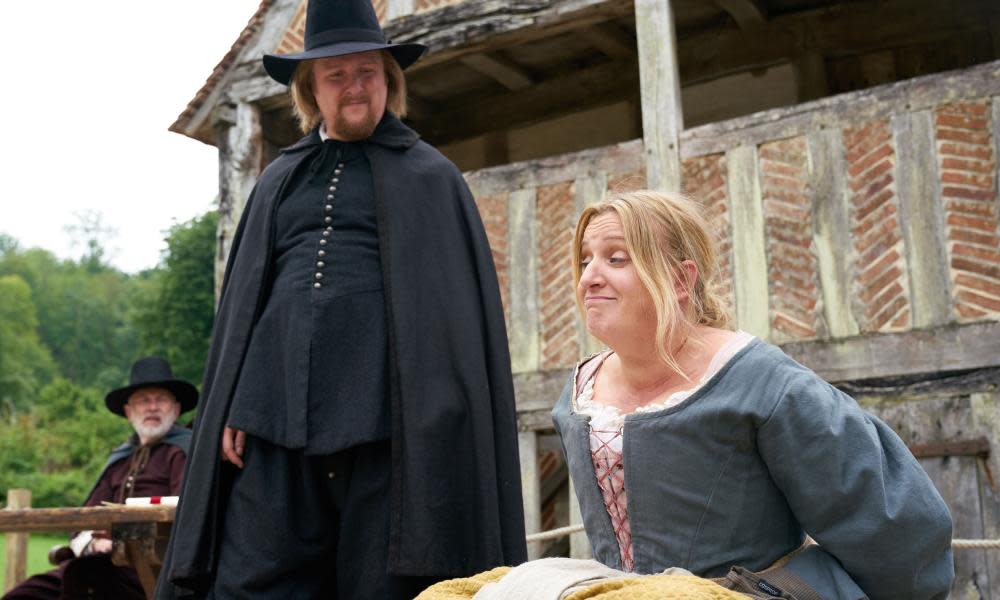The Witchfinder review – a comedy with so much wasted potential it makes you sad

Daisy May Cooper, Tim Key and other stellar talents are hamstrung by this period comedy’s thin story and unimpressive jokes
It’s such a fertile premise, so resonant with the times that you wonder why we aren’t besieged with dramas, documentaries and podcasts set in and around the mid-17th century – time of civil war, plague and an equally poisonous outbreak of misogyny that gave England literal witch-hunts.
But no matter. It’s a time and a set of subjects that’s just as ripe for comedy – as black and bitter, you might expect, as a suspicious old crone’s brew – and here comes one with as distinguished a cast and pedigree as you could hope. The Witchfinder (BBC Two) is written by Neil and Rob Gibbons, who gave us the glorious return of Steve Coogan as his most famous character, in the pitch-perfect daytime television spoof This Time with Alan Partridge (Coogan is listed as a script consultant on the new show) and it stars – well, everyone you’d want it to, really. It features Tim Key (Partridge’s hapless sidekick Simon, known as Sidekick Simon, in This Time and who has long deserved the upgrade to main role that he gets here, even if he does seem to be exactly half Coogan and half Ricky Gervais in content and delivery), Daisy May Cooper (from the impeccable This Country), comedy stalwart Jessica Hynes, Daniel Rigby (an unforgettable Eric Morecambe in 2011 and great in everything since) and various other familiar faces that let you know you should be in for a good time.
Alas, that time never really arrives. Key plays failing Norfolk witchfinder Gideon Bannister – we first meet him trying on a new witchfinding hat, hoping it will change his fortunes – and Hynes his spirit-bolstering companion Old Myers. Rigby plays his more successful and bumptious rival Hebble and Cooper plays Thomasine Gooch, an unmarried woman who is inevitably accused of witchcraft. She points out that there are many other unmarried women around. “There’s something not right about the way you’re unmarried,” comes the unanswerable answer.
If the programme featured more of this kind of thing – satirical evocations of another time and its insane contradictions (especially in light of how many we find ourselves in the middle of today) – it might work. There is plenty of scope, if you know your period well enough, to do a Blackadder and fill the script with clever, acute jokes (was Puritan ideology ever as well captured as in: “I sit on Nathaniel. Two spikes would be an extravagance!”?) that put some meat on daft bones. It has occasional fine flourishes, but for the most part The Witchfinder unfortunately seems as if it was put together by people who remember a GCSE plague project, have read the Wikipedia entry for 17th-century witchfinder Matthew Hopkins and hoped that would be enough.
There aren’t too many jokes of the more straightforward kind, either. The actors bring as much as they can to the parts, without ever hamming it up, but lines such as “Scripture, scruples, scrutiny – the three Scr’s” are never going to raise much more than a smile even with the most generous-hearted viewers.
The story is thin. The Witchfinder General’s right-hand man, John Stearne, visits Gideon’s village and is murdered, allowing Gideon to set off for his next meeting in the hope of taking his place and finally moving up the ranks (“I would love three dead kids – proper witchcraft.”) He takes the accused Thomasine with him to provide material for a trial once he gets there. Cooper’s Thomasine is essentially the pathologically obdurate Kerry from This Country with intelligence, which makes her an absolutely formidable force and far-from-ideal companion for Gideon as they set off on a thwarted journey across the Civil War-stricken countryside towards their destination. She ponders his pay structure, which grants him more for a guilty verdict than a finding of innocence: “Wonder if that’s the best way of doing it?”
But she, like Hynes (who I don’t think is given a single punchline – her every scene seems to end before anyone was moved to find one), is woefully underused. Whether this is just part and parcel of a programme whose every aspect is underbaked and doesn’t seem to know how to make best use of most of its gifts, or some manifestation of the enduring boys’-club nature of comedy writing and commissions, I don’t know.
Only two episodes of the six were available for review, so maybe it tightens up, adds more jokes, Blackadderish moments – some darkness in the mould of Julia Davis’s sitcom Hunderby would be equally welcome – and thickens the plot to reward the goodwill viewers bring to projects with such pedigrees. I hope so. At the moment, it’s a comedy with so much wasted potential it makes me sad.

 Yahoo News
Yahoo News 
